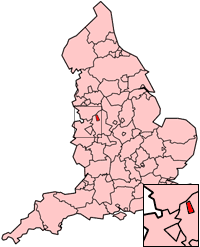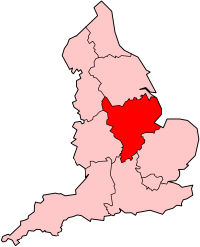American English, sometimes called United States English or U.S. English, is the set of varieties of the English language native to the United States. English is the most widely spoken language in the United States and in most circumstances is the de facto common language used in government, education and commerce. Since the late 20th century, American English has become the most influential form of English worldwide.
Received Pronunciation (RP) is the accent traditionally regarded as the standard and most prestigious form of spoken British English. For over a century, there has been argument over such questions as the definition of RP, whether it is geographically neutral, how many speakers there are, whether sub-varieties exist, how appropriate a choice it is as a standard and how the accent has changed over time. The name itself is controversial. RP is an accent, so the study of RP is concerned only with matters of pronunciation; other areas relevant to the study of language standards such as vocabulary, grammar, and style are not considered.

Scouse, officially known as Liverpool English or Merseyside English, is an accent and dialect of English associated with the city of Liverpool and the surrounding Liverpool City Region. The Scouse accent is highly distinctive as it was influenced heavily by Irish and Welsh immigrants who arrived via the Liverpool docks, as well as Scandinavian sailors who also used the docks, and thus has very little in common with the accents found throughout the rest of England. Natives of Liverpool are officially known as Liverpudlians, but are usually called Scousers; the name comes from scouse, a stew originating from Scandinavian lobscouse eaten by sailors and locals.
In phonetics, vowel roundedness is the amount of rounding in the lips during the articulation of a vowel. It is labialization of a vowel. When a rounded vowel is pronounced, the lips form a circular opening, and unrounded vowels are pronounced with the lips relaxed. In most languages, front vowels tend to be unrounded, and back vowels tend to be rounded. However, some languages, such as French, German and Icelandic, distinguish rounded and unrounded front vowels of the same height, and Vietnamese distinguishes rounded and unrounded back vowels of the same height. Alekano has only unrounded vowels. In the International Phonetic Alphabet vowel chart, rounded vowels are the ones that appear on the right in each pair of vowels. There are also diacritics, U+0339◌̹COMBINING RIGHT HALF RING BELOW and U+031C◌̜COMBINING LEFT HALF RING BELOW, to indicate greater and lesser degrees of rounding, respectively. Thus has less rounding than cardinal, and has more. These diacritics can also be used with unrounded vowels: is more spread than cardinal, and is less spread than cardinal.
English phonology is the system of speech sounds used in spoken English. Like many other languages, English has wide variation in pronunciation, both historically and from dialect to dialect. In general, however, the regional dialects of English share a largely similar phonological system. Among other things, most dialects have vowel reduction in unstressed syllables and a complex set of phonological features that distinguish fortis and lenis consonants.

East Anglian English is a dialect of English spoken in East Anglia, primarily in or before the mid-20th century. East Anglian English has had a very considerable input into modern Estuary English. However, it has received little attention from the media and is not easily recognised by people from other parts of the United Kingdom. East Anglia is not easily defined and its boundaries are not uniformly agreed upon.
There are a variety of pronunciations in modern English and in historical forms of the language for words spelled with the letter ⟨a⟩. Most of these go back to the low vowel of earlier Middle English, which later developed both long and short forms. The sound of the long vowel was altered in the Great Vowel Shift, but later a new long A developed which was not subject to the shift. These processes have produced the main four pronunciations of ⟨a⟩ in present-day English: those found in the words trap, face, father and square. Separate developments have produced additional pronunciations in words like wash, talk and comma.
In English, many vowel shifts affect only vowels followed by in rhotic dialects, or vowels that were historically followed by that has been elided in non-rhotic dialects. Most of them involve the merging of vowel distinctions and so fewer vowel phonemes occur before than in other positions of a word.
Most dialects of modern English have two close back vowels: the near-close near-back rounded vowel found in words like foot, and the close back rounded vowel found in words like goose. The STRUT vowel, which historically was back, is often central as well. This article discusses the history of these vowels in various dialects of English, focusing in particular on phonemic splits and mergers involving these sounds.
In linguistics, free variation is the phenomenon of two sounds or forms appearing in the same environment without a change in meaning and without being considered incorrect by native speakers.

The spoken English language in Northern England has been shaped by the region's history of settlement and migration, and today encompasses a group of related accents and dialects known as Northern England English (or, simply, Northern (English) in the United Kingdom).

Potteries is an English dialect of the West Midlands of England, almost exclusively in and around Stoke-on-Trent, Staffordshire.
A lexical set is a group of words that share a particular phonological feature.

East Midlands English is a dialect, including local and social variations spoken in most parts of East Midlands England. It generally includes areas east of Watling Street, north of an isogloss separating it from variants of Southern English and East Anglian English, and south of another separating it from Northern English dialects. This includes the counties of Derbyshire, Leicestershire, Lincolnshire, Nottinghamshire, Rutland and Northamptonshire. Dialects of northern Derbyshire, Nottinghamshire and Lincolnshire usually share similarities with Northern English dialects. Relative to other English dialects, there have been relatively few studies of East Midlands English.

The Lancashire dialect refers to the Northern English vernacular speech of the English county of Lancashire. The region is notable for its tradition of poetry written in the dialect.
The English language spoken and written in England encompasses a diverse range of accents and dialects. The language forms part of the broader British English, along with other varieties in the United Kingdom. Terms used to refer to the English language spoken and written in England include English English and Anglo-English.

Mancunian, sometimes shortened to Manc, is the accent and dialect of English spoken in Manchester and some of the wider Greater Manchester area. It is also the name of a native or resident of Manchester. Described as "twangy" and "euphonic", it is sometimes regarded as one of the friendliest accents in the UK.

Egerton Leigh was a British landowner, soldier, Conservative politician and author.

Welsh English comprises the dialects of English spoken by Welsh people. The dialects are significantly influenced by Welsh grammar and often include words derived from Welsh. In addition to the distinctive words and grammar, a variety of accents are found across Wales, including those of North Wales, the Cardiff dialect, the South Wales Valleys and West Wales.
In English, the digraph ⟨ng⟩ often represents the velar nasal, as in long and nothing. In other cases, it represents a sequence of the velar nasal followed by the voiced velar stop, as in longer, which had been the original pronunciation of the digraph up until Early Modern English when the sound was lost in most words, giving a phonemic status in English. Another pronunciation is, as in angel and one pronunciation of longevity.









